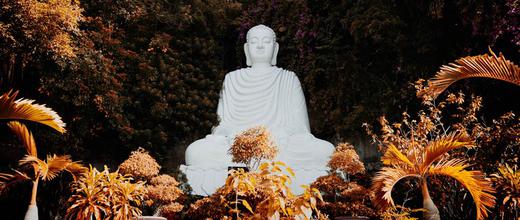The views expressed in our content reflect individual perspectives and do not represent the authoritative views of the Baha'i Faith.
Separated by two and a half millennia, the Buddha and Baha’u’llah’s teachings bear some striking resemblances.
The Buddha, the son of a king, grew up in the protected walls of a palace; Baha’u’llah, the son of a wealthy government official, was also born into a life of privilege. The Buddha chose to live life outside the palace walls and find a way out of the suffering that plagues all human beings. Baha’u’llah, too, though offered a distinguished career in government, chose instead to place his attention and energy on helping the poor.
Another similarity between these two religious founders is the way in which they regarded the world around them. Both emphasized its impermanent nature and the need to transcend it.
“Baha’u’llah also stressed the futility of this fleeting world to fulfill us”
When we look around us, we see a world of distinct things: tables and chairs, plants and trees, hills and the sun. We wake up the next day and see the same things, which makes it seem as though all things are quite stable. Of course, the things in life change, but their apparent permanence fools us into complacency.
The central focus of the Buddha’s teachings was the fact that human suffering is inescapable. Linked to this suffering is desire: desire to flee what is painful and have what is pleasurable. But desire can never satisfy a person because everything we desire is impermanent. Throughout his writings, Baha’u’llah also stressed the futility of this fleeting world to fulfill us.

Both figures also emphasized the importance of transcending this world. In order to attain inner tranquility, we need to detach from the world around us—to relinquish our desire and distaste for things. In the words of Baha’u’llah, each individual must: “purge his breast, which is the sanctuary of the abiding love of the Beloved, of every defilement, and sanctify his soul from all that pertaineth to water and clay, from all shadowy and ephemeral attachments. He must so cleanse his heart that no remnant of either love or hate may linger therein, lest that love blindly incline him to error, or that hate repel him away from the truth.”
Here we can see that “love” refers to our attraction to the things of this world, and “hate” refers to our aversion to them. Both need to be relinquished, because we cannot find fulfillment in a withering world. This is why both the Buddha and Baha’u’llah stressed the need to transcend this transient world and reach for something more lasting by growing spiritually.
The notion of impermanence, or anicca in Buddhism, is also linked to the notion of emptiness (sunyata), that nothing has a fixed essence. Everything that exists is constituted by the unceasing relationship of cause and effect, birth and death. Since we are part and parcel of this world, we too are constantly changing, with old cells dying and new cells being born. But this change also takes place within, as throughout our lives our thoughts, beliefs and even perceptions all undergo significant change. Because of this, Buddhists believe that like all things in existence, the human being has no fixed essence.
“In both the Buddhist and Baha’i paths, there is an escape from impermanence through spiritual growth”
This is different from the Baha’i teaching that our souls are immortal. While the world around us is impermanent, God is permanent, so the way to transcend the fleeting world is by reaching Him. The Baha’i path of spiritual growth consists of affirmation and adoration, and through that, detachment from this world.
In both the Buddhist and Baha’i paths, there is an escape from impermanence through spiritual growth. The goal of this life is to purify ourselves and detach so that we can attain a more lofty and lasting state. In Buddhism this is done through releasing all attachment to the world and the self and entering the state of Nirvana. The following quotation from the Baha’i Faith explains that it is achieved through loving God and entering the paradise of nearness to him:
“Live then the days of thy life, that are less than a fleeting moment, with thy mind stainless, thy heart unsullied, thy thoughts pure, and thy nature sanctified, so that, free and content, thou mayest put away this mortal frame, and repair unto the mystic paradise and abide in the eternal kingdom forevermore.”

















Comments
Sign in or create an account
Continue with Facebookor